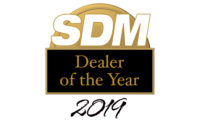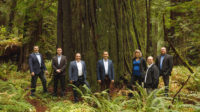Across the board, employees who work at this year’s SDM Dealer of the Year say they feel both love and passion behind what they do. A large part of the reason for that is the culture that is encouraged top-down by their CEO, a second generation leader who took the helm from her father, Leigh J. Johnson. Johnson founded the company in 1968 and is still a major shareholder, although no longer involved in the daily business.
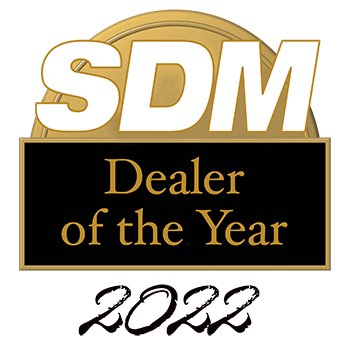
Custom Alarm, based in Rochester, Minn., describes itself as a “customer service company leveraging technology to help find solutions for our customers.” But "customer service" goes above and beyond at the company, including to CEO Melissa Brinkman’s own “customers” — her employees. This is truly a legacy from her father’s attitude about business, Brinkman says. “My dad was a typical entrepreneur doing a startup in his basement,” she says. “It started with him and my mom helping a bit. He would go and sell in the morning and install later in the day.”
At a Glance: Custom Alarm
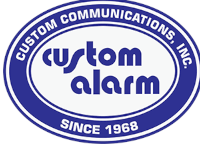
Ownership: LJ Johnson
Websites: custom-alarm.com
Employees: 71
2022 Revenue: $17 million (estimated)
2022 RMR: $317,000 (estimated)
Customers: 4,160
2022 SDM 100 Rank: 74
From a basement startup to an office in Rochester with 71 close-knit employees, the family-owned business has never wavered in this approach.
“[My dad] always treated his employees like family, while still expecting them to do their job,” Brinkman explains. “He was always very involved in the community through different boards and also giving back — what he called his ‘community taxes.’ He was really focused on supporting local businesses and customers, and I have continued to do that and take it to another level.”
This philosophy is why this month’s cover pictures were taken at a local children’s museum, SPARK!, a Custom Alarm customer and favorite spot for the company to hold events with employees and their families. Custom Alarm truly goes all out to not only take care of its customers, but to patronize and utilize their goods and services as well, in a mutual exchange that harkens back to that community taxes philosophy.
Custm Alarm’s emphasis on employee happiness and well-being and a culture centered around helping each other and customers has paid off in its ability to retain good employees during what many experienced as “The Great Resignation,” by strategic hiring and realigning people to the right seat; achieve double-digit revenue growth during the height of the pandemic, with 18 percent growth in 2021 and a projected 30 percent in 2022; and continue to innovate with technology offerings including cloud-based managed services in both access control and fire.
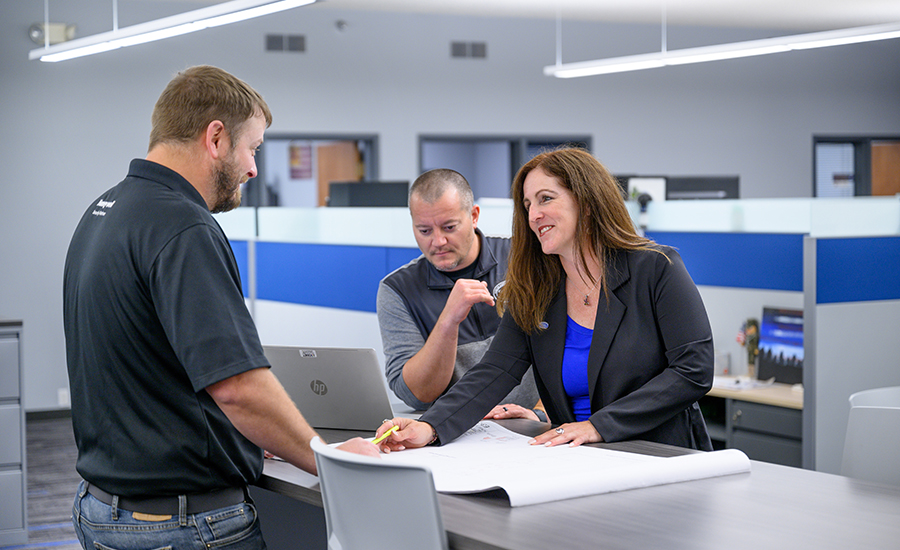
Melissa Brinkman views her employees as her “customers,” and makes an effort to get to know them and engage with each of them on a daily basis.
A Creative & Supportive Environment
Custom Alarm is a “family business,” yes; but not all work families are as close-knit as this one. “You really get to know everyone on a personal level,” says Bob Boland, chief operating officer, who has worked for Custom Alarm for 11 years. “This really is a family. We do things outside of work together. This is the first place I have worked where it feels like a family inside and outside of the business.”
One reason for this, he says, is that the company champions its employees in and out of work. “We are truly committed to making everyone better. We are only as good as our weakest, knowledgeable employee. … It is really refreshing to come to a place that wants you to do your best and gives you a path to get there.”
Like many security dealers Custom Alarm relies on a combination of manufacturer and industry training opportunities, along with a structured online training program, which really came in handy during the pandemic.
“We didn’t lay anyone off," Boland says. Instead, the company put a lot of emphasis on training. “We did have plenty of work going on, but we also moved people to cross-training into other areas. We have technicians who focus on certain areas of our business, whether that is residential or fire or advanced systems like video and access control. People were very open to do doing these things as well. Everyone knew the environment we were in.”
Ryan Miller, customer experience manager, credits Brinkman directly with the family feel at the company. “Melissa does such a great job of making sure her employees are wanted and respected and their opinions are heard — any kind of interaction to make sure associates feel loved and wanted. … People enjoy working here. I see less stress on my team’s face versus my previous [workplace].”
From coming in before 7 a.m. to make sure she walks around the office and greets the technicians before they go out on their jobs to sponsoring an employee’s frisbee golf event last minute, Brinkman definitely sets the tone, agrees Craig Muenkel, operations manager. “The culture at Custom Alarm is night and day from anywhere I have worked in the past,” he says. “Melissa really, really forces culture in our company and fosters it through multiple different ways.
Everyone here knows everyone and probably their family and friends as well. There is frequently a coffee truck in the parking lot. Yesterday was taco day. She is always doing little things like that to bring the group together. When you hang out in a more casual atmosphere you get a different exposure. Techs put their tools down. Everyone relaxes and sits and chats, versus having work in the forefront. It also helps people feel more comfortable with management.”
Managing the Supply Chain
Like most of their fellow security dealers and integrators, one of the biggest challenges Custom Alarm has faced in the last year has been the supply chain, and not being able to accurately and confidently schedule installations with customers.
In order to stay on top of things and keep customers happy they relied on a combination of manufacturer relationships, finding and training on new products and are in the planning stages to expand warehouse capacity as they have seen project needs go from “just in time” to “just in case.”
“We have had to order things way ahead to make sure we have enough bandwidth to get those parts in,” Bob Boland says. “That has been the biggest issue, not having a reliable supply chain.”
While he sees it improving slightly, at the time of publication Custom Alarm was poised to move ahead with plans in 2023 to build out warehouse space to alleviate some of these operational inefficiencies.
“I think it is getting better, but I don’t know if it will ever get back to where it was,” Boland says. “Certain companies still have huge supply chain issues. We have had to look at different manufacturers to source parts. … I do think at least in the near future we will continue to buy more than we need and take on more inventory. There is some risk there, but it is outweighed by the idea of not being able to get it at all. I think that is something that will stay with us for a while.”
Another big challenge has been finding alternate products, and then training techs on the new product. This involved some candid conversations with customers.
“We really looked hard at offering different brands and products to our customers. We have conversations with customers to ask, ‘How important is it to get this done in this time frame?’ We found that almost all customers were very understanding because they were witnessing it in their own world as well,” Boland says.
“I think, as a whole, everyone felt like we were all in this together. It doesn’t make it right, but it seemed like the bigger corporations seemed to be more understanding of it. But there were a lot of residential customers that didn’t understand.”
Custom Alarm made every effort to go with brands where they already had relationships, but there were some where they had to branch out to something new. This presented a different type of challenge — training on products while the job was going on.
“It’s tough to pause your schedule so you can notch a day or two in to train,” Craig Muenkel says. “We are in the process of doing it right now with DMP. We took a couple days off, cleared the schedule and did technical and sales training. We looped in an install while the guys were still here. One day of training isn’t ideal but it is what we had to work with.”
They also have to loop in the customer in these situations, Muenkel says. “The first two or three installations [on the new product], in the sale upfront the conversation is that this is a new offering that we are currently training on. We do want to set that expectation in the initial installations because it might take a bit longer. We want to give them the heads up”
In an era where every side of the security industry is experiencing a talent crisis, Muenkel says that while finding qualified employees is still a challenge, keeping them is not. “Because of our culture and the ideas we foster here in the company it really helps with employee retention. Every place you go a job is a job. You could do this with 30 other companies. But the offerings internally with our company keep employee turnover to a minimum.”
Brinkman explains that she considers her employees to be her customers. “I need to take care of them so they can do their best to take care of their customers. If they don’t feel appreciated or that their voice is being heard, they won’t give their best.
“I really try to make sure I have good relationships with all the employees … and invest in them, not just in the work they do. … It’s not always about what you get paid in a job but also intrinsic things that show you are not just a number.”
One of the ways Custom Alarm approaches employee satisfaction a little differently is through a strengths finder assessment done on an as-needs basis. “Realigning is one of my fortes,” Muenkel says. “I like to look at and assess the talent we have and we do that across the company. We only have about 70 employees so we are pretty agile. We are constantly trying to evolve with the industry but also make sure we have the right person in the right seat. Do we have the right position? Do we have the right individual in that position? Maybe their talents are best served elsewhere.”
Muenkel cites a recent example where a project manager role was reassessed. “His strengths weren’t being fully utilized. We realized he had such strong technical and customer service skills, but in his current position he wasn't able to showcase those as much. We also realized we were in need of a full-time design support person to help the sales team understand how the pieces work and fit together. Through that assessment tool I came to the realization that this individual wasn't in the best seat; but there was a huge upside of where we could use him more effectively. I had a conversation with him and it went really well. … There was no pushback at all. He recognized that in this new role he make a bigger impact, be more successful and that this position leverages all his strengths.”
In addition to making sure the employee is the right fit for the job, Custom Alarm also puts an emphasis on ensuring their employees are fit both physically and emotionally as well. While the company certainly enjoys food treats like tacos, pizza and ice cream, it also puts a focus on wellness, including offering fresh fruit the first week of the month in the lunchroom, providing a healthy vending area and hosting different “health-focused” contests throughout the year. There is also an annual reimbursement for wellness activities and equipment.
It all started with running shoes, Brinkman says. “In the 1980s my dad would give $100 in wellness money and if you bought a pair of running shoes he would reimburse you by that amount. That evolved over the years beyond just buying equipment to embody all aspects of health and well-being. We focus on the whole person, not just weight or food, but family activities like snow tubing, which is a nice way to get physical activity and meet the family members. It is not necessarily our job as an employer, but it is our responsibility to make sure the employee is the best version of themselves.”
But that doesn’t mean there aren’t monetary bonuses as well. Custom Alarm has offered profit sharing for over 20 years, Brinkman says. And each employee has an annual review. There are also sometimes unexpected bonuses for a job well done, Muenkel says.
“This past year we had 10 schools where we were changing out their fire systems and lockdown units. … Those techs came in 1,300 hours under the estimate, which is amazing. They really knocked it out of the park. At the end of those projects we looked at the profit and saw it was above what we had estimated. We could have absorbed that into the company but Melissa looked at it and said, ‘You should give bonuses to the team for what they did.’ That is another one of those things that really speaks to the culture here.”
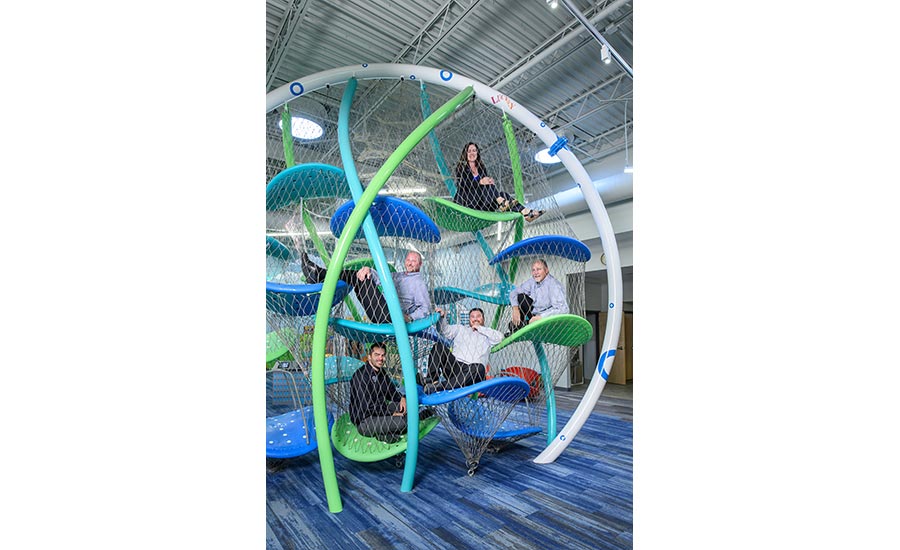
Custom Alarm prides itself on being a creative and supportive place to work, and emphasizes having fun together inside and outside of work.
Prioritizing Customer Care
Just as it does with its own employees, Custom Alarm tends to go a little “extra” when it comes to interacting with customers. One of the intangible ways it does this is by going above and beyond to make sure they are also customers of their customers. All of those tacos, pizza, healthy snacks and employee outings? Whenever possible they use customer products or services, then make sure to shout out to them on social media, or include their name if it is in a gift basket.
“We focus on doing business with our customers, whether it is banking, food or clothing,” Brinkman says. “I feel like that is just good business. If someone is doing business with us I try to do business with them.”
The company has put together a list for its employees of different restaurants and encourages them to patronize them, for example. A recent golf outing for employees was held at a customer’s facility. And those few employees who don’t golf and volunteered to stay and man the phones were treated to lunch brought in from another customer.
Custom Alarm Management Team
Melissa Brinkman, CEO
Bob Boland, Chief Operating Officer
Craig Muenkel, Operations Manager
Brandon Clig, Sales Manager
Ryan Miller, Customer Experience Manager
Sometimes this costs more, but Brinkman feels strongly that it is the right thing to do and also just good business practice. It also pays off in good will. She shares an example from last year when they had brought in salsa from a local company and they needed chips to go with the salsa. “There wasn’t anyone local that made them, but we did have a local grocery store customer that sold chips, so we went and bought them out of chips. Shortly thereafter they contacted us for a camera system.
“We could have gone to Costco and bought those chips less expensively but we wanted to support local. … Even when we order lunch it might be less expensive to do something else, but I want to give them our business and it also introduces our team to our customers, and to a great local business they can patronize on their own. I want our customers to be successful.”
Anna Bradt, marketing and communications manager, adds, “Rochester is large, but also a small community as far as businesses go. Everyone knows everyone. When you use your customers other people hear that, appreciate that and when they are trying to decide whether to use us, they know we like to shop local. When we look to do employee gifts, lunches, etc., we look at who our customers are, then we do a shout out on Facebook, ‘Great food from X company,’ and tag them. It shows our customers we practice what we preach.”
Taking care of customers was also the reason behind the company’s decision to move from in-house to a third- party monitoring company in late 2019. By the time the research was done and they were ready to make the switch it was May 2020, right as the pandemic was in full swing. (For more on this process see sidebar below: Moving to Third-Party Monitoring in the Midst of a Pandemic.)
Moving to Third-Party Monitoring in the Midst of a Pandemic
Like most of their fellow security dealers and integrators, one of the biggest challenges Custom Alarm has faced in the last year has been the supply chain, and not being able to accurately and confidently schedule installations with customers.
In order to stay on top of things and keep customers happy they relied on a combination of manufacturer relationships, finding and training on new products and are in the planning stages to expand warehouse capacity as they have seen project needs go from “just in time” to “just in case.”
“We have had to order things way ahead to make sure we have enough bandwidth to get those parts in,” Bob Boland says. “That has been the biggest issue, not having a reliable supply chain.”
While he sees it improving slightly, at the time of publication Custom Alarm was poised to move ahead with plans in 2023 to build out warehouse space to alleviate some of these operational inefficiencies.
“I think it is getting better, but I don’t know if it will ever get back to where it was,” Boland says. “Certain companies still have huge supply chain issues. We have had to look at different manufacturers to source parts. … I do think at least in the near future we will continue to buy more than we need and take on more inventory. There is some risk there, but it is outweighed by the idea of not being able to get it at all. I think that is something that will stay with us for a while.”
Another big challenge has been finding alternate products, and then training techs on the new product. This involved some candid conversations with customers.
“We really looked hard at offering different brands and products to our customers. We have conversations with customers to ask, ‘How important is it to get this done in this time frame?’ We found that almost all customers were very understanding because they were witnessing it in their own world as well,” Boland says.
“I think, as a whole, everyone felt like we were all in this together. It doesn’t make it right, but it seemed like the bigger corporations seemed to be more understanding of it. But there were a lot of residential customers that didn’t understand.”
Custom Alarm made every effort to go with brands where they already had relationships, but there were some where they had to branch out to something new. This presented a different type of challenge — training on products while the job was going on.
“It’s tough to pause your schedule so you can notch a day or two in to train,” Craig Muenkel says. “We are in the process of doing it right now with DMP. We took a couple days off, cleared the schedule and did technical and sales training. We looped in an install while the guys were still here. One day of training isn’t ideal but it is what we had to work with.”
They also have to loop in the customer in these situations, Muenkel says. “The first two or three installations [on the new product], in the sale upfront the conversation is that this is a new offering that we are currently training on. We do want to set that expectation in the initial installations because it might take a bit longer. We want to give them the heads up”
But rather than just eliminate the entire monitoring staff and move everything over to Affiliated Monitoring, Custom Alarm chose to morph its previous monitoring center space into a new “Customer Experience Center,” designed to help smooth out the process for customers, answer questions and troubleshoot anything that can still be handled by the local staff customers were used to contacting.
With a customer base that is 30 percent residential and 70 percent commercial, it was important not to lose that local connection.
“We decided we needed to keep some of those trained staff on to answer the basic and not so basic questions customers have,” Miller says of the move, which occurred just before he came to work for the company. “Our customers get used to the people we have and now they can put a system on test, answer basic remote troubleshooting questions, program cell communicators, create new accounts, or go through our no test list and dispatch report to find out if a customer actually had an emergency. They go through high signals reports and call on those customers to say they are noticing they are getting a lot of signals coming in. It is a little bit of everything.”
Unlike the monitoring center, the experience center is staffed from 6:30 a.m. to 5:30 p.m., but it gives Custom Alarm a way to still have a touchpoint with customers as well as utilize some of that training and experience the former monitoring staff already had.
Any contact with a customer is an opportunity to make things better for them, Brinkman says. For example, she shared a recent example from the experience center with a customer who was having Wi-Fi issues and turned to Custom Alarm to help fix them. “[That’s not] really on us, but if their cameras aren’t working it impacts us. We will make investments in our customers to make sure their system is working to their satisfaction.”
Another example comes from Brandon Clig, sales manager, who had a customer recently that was having HVAC issues. “While we were talking about a fire alarm system he started asking about HVAC, so I passed along another customer’s information for that. We are a good resource for our customers. They put their trust in us so they know if we are going to recommend another customer, we have vetted them.”
Referrals are also one reason Clig cites for the company’s shift over the past decade from residential to more commercial work. “It was not really planned or strategized; it just happened with the growth of the Rochester community and referrals from projects. We seem to have a sweet spot of about 90 miles around Rochester.”
Of course the bread and butter of any security dealer is installing and monitoring technology, and Custom Alarm has made sure to stay up on some of the latest technology trends for its customers.
While more commercially focused, Custom Alarm does still have a “good hold” on residential, with more than 2,000 residential customers. For those customers, the customer care approach comes more in the form of switching from security-first to home automation and convenience, Clig says.
Podcast: With Custom Alarm CEO Melissa Brinkman
SDM spoke with Melissa Brinkman about Custom Alarm’s origins, company culture, being a female CEO in the security industry, and much more.
“We are in a pretty good area. Crime isn’t high by any means, so going to customers with a straight security solution [was a harder sell]. We work with buildings and homeowners who want more automation. They want garage doors and Z-Wave locks and cameras. What we did about two years ago is start saying, ‘We can do home automation for you with some security and life safety devices.’ We came at it from that angle and found that it worked pretty successfully, especially with home builders.”
Commercially, Custom Alarm has found success recently offering cloud-based services such as access control, and even fire-related services through a beta test project with Notifier’s Connected Life Safety Services app/web interface at one of its larger customers. “We rolled out a large connected life safety system with one piece of hardware on-site that is connected to the fire alarm panel. Through cloud services they are able, as an end user, to view everything they normally would by going to their web browser. We are finding that custodian services teams especially like to log in remotely and look at the panel to see what is going off.”
While fire codes still require people to be on site to make any changes, knowing the problem in advance, or whether it is just a nuisance alert that can wait until morning, is a big advantage to the beta customer, Clig explains.
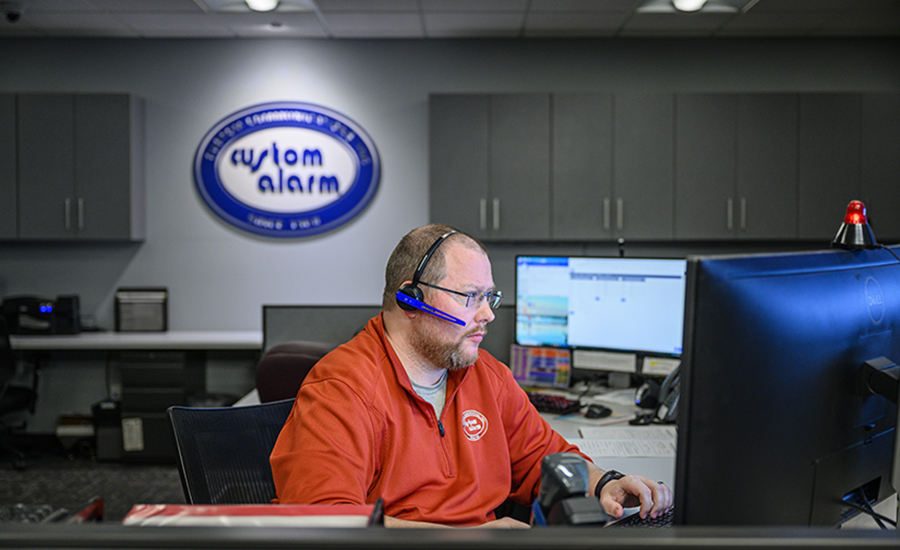
When Custom Alarm moved to a third-party monitoring center in 2020 they converted their former monitoring center into a new Customer Experience Center.
Future Plans
Cloud is something Custom Alarm is looking to do much more of in the coming years, Clig says. “We want to see our RMR in double digit growth year-over-year, especially with commercially-based cloud solutions. Historically we have had recurring revenue from the residential side, but now with the commercial side that is something to focus on within the next two years.”
While 2021 and 2022 have been very strong years, like many others Clig does anticipate a bit of a slow down in 2023. “We are having a record year this year. [The beta test project] was a good chunk of our revenue, but we do still see opportunity in the future with that customer. We won’t have the initial revenue we had last year for that. We also had a couple of larger school projects this year. I would love to continue to grow at the rate we have but I anticipate a bit of a decline next year.”
These school projects won Custom Alarm SDM’s inaugural Project of the Year award in August.
Schools remain a growing opportunity for Custom Alarm, Clig says, for both security and fire. “The schools are receiving grants for security. What we are able to do is due to code changes they have to upgrade to a voice system. We say, ‘We can take care of this, but there are other things we can do with security such as tie in lockdown capabilities and weather. All of these signals are running through the fire alarm, but it has a big appeal on the security side.”
Fire is also another big focus right now, Muenkel says. “We have hired three new fire techs in the past year. Fire is our fastest growing segment of our company right now. … We have focused more on the fire side, with Notifier being our partner. We have some of the largest fire installations in the country.”
The company also has plans to do more marketing and reach-out beyond what they already do.
“With all of our customers we have a good follow-up and Q&A process,” Clig says. “This coming year we will be focusing more on that, asking for more referrals. We are a pretty small community and people know each other. We are doing some targeting campaigns with access control cloud. Each time we are talking to a customer we find different reasons they are benefitting from something like that.”
Another way they are reaching customers is through targeted advertising on streaming sites and a chat service called Podium that lets technicians immediately text customers after installation with a link to fill out a Google review, Bradt explains.
Finally, Custom Alarm is also planning to build out its remote support team, Brinkman says. “We have one person designated for that right now, but we are looking to build up the team. We have that on the roadmap. That team right now provides remote support both for techs in the field as well as customers, whether they need help reviewing cameras or troubleshooting a problem by dialing in remotely before rolling a truck. We are selling more remote services right now.”
One way Custom Alarm has not historically looked to grow, according to Brinkman, is by acquisition — although she doesn’t rule it out completely. “We have had a few small ones over the years, with less than 100 accounts at a time. Are we planning any in the future? We are always looking at opportunities, but also focusing on properly taking care of the growth of our existing customers. Acquisition is a heavy lift. We are open to it, but looking to the right fit if we did it.
“My longer-term goals are looking to see how we can continue to grow the organization and team. We have a lot of great opportunity within our market, and I want to find ways to grow with our existing team because we have such an awesome team. … Because of the way our industry has grown, I encourage people to bring ideas forward on how we can stay competitive and be nimble. Our best opportunity for growth is through our employees, so to continue to be an employer of choice and have people want to come make a career of it is how we can sustain that growth.”


